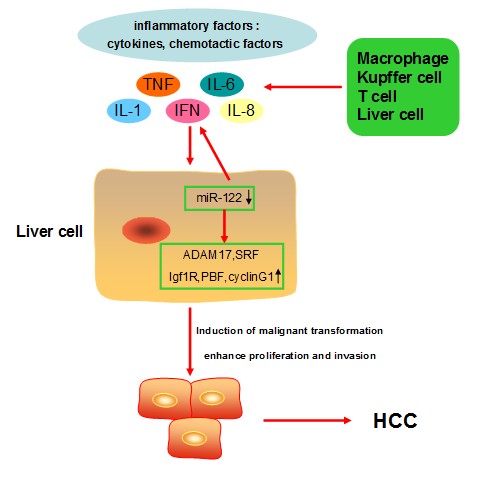Chronic hepatitis B virus infection plays a central role in the development of hepatocellular carcinoma (HCC). It is of great scientific significance and application value to prevent HCC transforming from chronic hepatitis B.
Prof. MENG Songdong’s research group at the Institute of Microbiology, Chinese Academy of Sciences found that the major inflammatory cytokines in chronic hepatitis, IL-6 and TNF-α, and induced a marked decrease of levels of a liver specific microRNA microRNA-122 (miR-122). MiR-122 expression was downregulated in the livers of chronic hepatitis B patients.
Further studies showed that IL-6 and TNF-α downregulated and inhibited a miR-122 transcription factor C/EBPα, which led to decreased transcription of miR-122. In mouse and rat models of diethylnitrosamine (DEN)-induced HCC, inducing miR-122 decrease by blocking IL-6 and TNF-αby with delivery of agomir-122 could suppress DEN-induced hepatocarcinogenesis in mice.
Their findings suggest that miR-122 may serve as an important target for chronic hepatitis B infection-induced HCC transformation.
The results was published in Oncotarget(http://www.impactjournals.com/oncotarget/index.php?journal=oncotarget&page=article&op=view&path%5B%5D=7740&path%5B%5D=22518). Dr. LI Changfei is the first author and Prof. MENG is the corresponding author.
Prof. MENG’s research group is focused on the mechanism of action of miR-122 in the chronic hepatitis B infection. They have published papers in Hepatology, Journal of Virology, Scientific Reports, etc. This is their 7th paper addressing on the mechanisms of action of miR-122.

The positive feedback pathway consisting of inflammatory factors- miR-122-target genes are involved in the process of chronic hepatitis induced HCC (Image by Prof. MENG’s group)
Contact:
Dr. MENG Songdong
CAS Key Laboratory of Pathogenic Microbiology and Immunology,Institute Of Microbiology,Chinese Academy of Sciences,100101,Beijing, China
E-mail: mengsd@im.ac.cn
